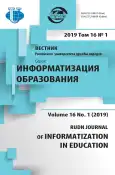ICT-tools for internationalization of continuous education
- Авторлар: Lvova O.V.1
-
Мекемелер:
- Moscow City Pedagogical University
- Шығарылым: Том 16, № 1 (2019)
- Беттер: 56-63
- Бөлім: INNOVATION PEDAGOGICAL TECHNOLOGIES IN EDUCATION
- URL: https://journal-vniispk.ru/2312-8631/article/view/333489
- DOI: https://doi.org/10.22363/2312-8631-2019-16-1-56-63
- ID: 333489
Дәйексөз келтіру
Толық мәтін
Аннотация
Problem and goal. Continuous education is a process of growth of educational (general and professional) potential of the individual throughout life via the use of the system of state and public institutions and in accordance with the needs of the individual and society. The need for continuous education arises due to the progress of science and technology, the widespread use of innovative technologies. Internationalization stands for the intentional process of integrating an international, intercultural or global dimension into the purpose, functions and delivery of education. Information and telecommunication technologies nowadays are a significant part of modern learning and play an important role in continuous education that uses different ICT-tools for its purposes but depending on the interpretation continuing education concept has its own specifics. Accordingly, various procedures for the use of information and telecommunication technologies are in demand. To make the application of ICT-tools for continuous education relevant to the specialized goals one should clearly understand the correlation among aims of continuous learning and ICT-tools. Methodology. Various procedures for the use of information and telecommunication technologies that are in demand for purposes of internationalization of continuous education are considered. A brief review of scope of ICT-tools and their potential and relevance to the specific aims of internationalization of continuous learning is given. Results. Internationalization of education and development of continuous education are nowadays very important processes all around the world. There are some main trends in application of ICT-tools/ technologies in internationalization of higher education currently being developed and widely used. Mostly all of ICT-tools/technologies can be used in continuous education to solve problems similar to higher education. Meanwhile new ICT-tools/technologies - virtual mobility, distant academic mobility and electronic internationalization - have great potential to be applied for internationalization under specific conditions of continuous education. Conclusion. It is demonstrated that information and telecommunication technologies supply internationalization of continuous education with not only well known ICT-tools/technologies but also new ones with powerful potential.
Авторлар туралы
Olga Lvova
Moscow City Pedagogical University
Хат алмасуға жауапты Автор.
Email: olglvova@yandex.ru.ru
candidate of pedagogical sciences, docent of the department of informatization of education
29 Sheremetyevskaya St., Moscow, 127521, Russian FederationӘдебиет тізімі
- Grigoryev S.G. Grinshkun V.V. Lvova O.V. Ispolzovaniye sredstv informatizatsii dlya formirovaniya tolerantnosti pri obuchenii v techeniye vsey zhizni [The use of informatization tools for the formation of tolerance in education throughout life]. Vestnik Moskovskogo gorodskogo pedagogicheskogo universiteta. Serija: Informatika i informatizacija obrazovanija [Bulletin of the Moscow City Pedagogical University. Series: Informatics and Informatization of Education]. 2016. No. 1 (35). Pp. 8—19.
- Grinshkun V.V. Razvitiye integrativnykh podkhodov k sozdaniyu sredstv informatizatsii obrazovaniya [Development of integrative approaches to the creation of means of informatization of education]. http://www.dissertations/archive/index.php (accessed: 10.10.2018).
- Pushkarev Yu.V., Pushkareva E.A. Nepreryvnoye obrazovaniye v sovremennykh usloviyakh: osnovnyye kontseptualnyye podkhody [Lifelong education in modern conditions: the main conceptual approaches]. Vestnik Novosibirskogo gosudarstvennogo pedagogicheskogo universiteta [Bulletin of the Novosibirsk State Pedagogical University]. 2015. No. 6(28). Pp. 161—171.
- Filippov V.M. Internatsionalizatsiya vysshego obrazovaniya: osnovnyye tendentsii, problemy i perspektivy [The internationalization of higher education: major trends, problems and prospects]. Vestnik Rossijskogo universiteta druzhby narodov. Serija: Informatizacija obrazovanija [Bulletin of Peoples’ Friendship University of Russia. Series: International relations]. 2015. No. 3. Pp. 203—211.
- Beelen J., Leask B. Internationalization at home on the move. Berlin: Dr. Josef Raabe Verlag, 2011. 204 p.
- Bremer L., Van der Wende M. Internationalizing the curriculum in higher education. The Hague: Nuffic, 1995. 74 p.
- Coelen R.J. Ranking and the measurement of success in internationalisation: are they related? Amsterdam, 2009. Pp. 39—48.
- Commission of the European Communities: adult learning: it is never too late to learn. Brussels, 2006. 89 p.
- Crowther P., Joris M., Otten M., Nilsson B., Teekens H., Wächter, B. Internationalisation at home: a position paper. Amsterdam: EAIE, 2001. 45 p.
- Department of Education and Science. Learning for Life: Paper on Adult Education. Dublin: Stationery Office, 2000. 112 p.
- De Wit H. Erasmus at 25: What is the future for international student mobility? www.theguardian. com/guardian-professional (accessed: 10.10.2018).
- Elspeth J., Jos B., Robert C., de Wit H. Local and Global Internationalisation. Sense Publishers. Dordrecht, 2016. 88 p.
- Fenwick T., Nesbit T., Spencer B. Contexts of adult education: Canadian perspectives. Toronto: Thompson Educational Publ., 2006. P. 17.
- Fischer G. Lifelong Learning — More than Training. Journal of Interactive Learning Research. 2000. Vol. 11. Pp. 265—294.
- Grubb N. Vocational Education and Training: Issues for a Thematic Review. OECD. November, 2006. 39 p.
- Hudzik J. Comprehensive internationalization: from concept to action. Washington: NAFSA, 2011. 231 p.
- Knight J. Updating the definition of internationalization. International Higher Education. 2003. Pp. 2—3.
- Leask B. Using formal and informal curricula to improve interactions between home and international students. Journal of Studies in International Education. 2009. Vol. 13(2). Pp. 205—221.
- Merriam Sh., Brockett R. The Profession and Practice of Adult Education: an Introduction. JosseyBass, 2007. P. 7.
- Rizvi F. Internationalizing the curriculum in higher education. Paris, 1996. 54 p.
- Spencer B. The purposes of adult education: a short introduction. Toronto: Thompson Educational Publ., 2006. Pp. 9—10.
- TeaCamp. http://teacamp.vdu.lt/content/about-project-0 (accessed: 10.10.2018).
Қосымша файлдар









